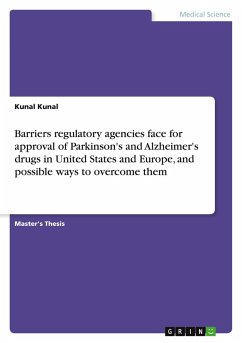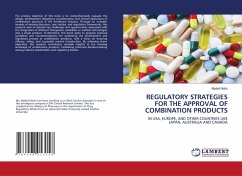
Barriers regulatory agencies face for approval of Parkinson's and Alzheimer's drugs in United States and Europe, and possible ways to overcome them

PAYBACK Punkte
0 °P sammeln!
Master's Thesis from the year 2023 in the subject Medicine - Pharmacology, Pharmacy, grade: A, , language: English, abstract: There are many challenges in developing effective treatments for neurodegenerative diseases like Parkinson's and Alzheimer's. Regulatory agencies in the US and EU play a significant role in determining the efficacy and safety of drugs used to treat these conditions. However, the approval process is convoluted and frequently encounters obstacles that delay timely access to critically needed treatments. This thesis seeks to identify, examine, and suggest potential remedie...
Master's Thesis from the year 2023 in the subject Medicine - Pharmacology, Pharmacy, grade: A, , language: English, abstract: There are many challenges in developing effective treatments for neurodegenerative diseases like Parkinson's and Alzheimer's. Regulatory agencies in the US and EU play a significant role in determining the efficacy and safety of drugs used to treat these conditions. However, the approval process is convoluted and frequently encounters obstacles that delay timely access to critically needed treatments. This thesis seeks to identify, examine, and suggest potential remedies for the problems regulatory bodies in both regions encounter. Through an extensive review of the literature, regulatory standards, and case studies, the thesis looks at the major challenges encountered throughout the drug approval process for Parkinson's and Alzheimer's diseases. Scientific roadblocks including the complexity of disease mechanisms and the lack of knowledge of sickness progression make it difficult to show therapy efficacy and choose the appropriate patient populations. Clinical issues arise from the diversity of the patient population, the dearth of reliable biomarkers, and the need for precise long-term data for therapy benefit assessment. Regulatory impediments are procedures and rules that differ between the US and Europe. These include changes to regulatory structures, clinical trial designs, and data requirements. Regulatory standards must be standardised, regulatory authorities must collaborate more closely, and data requirements must be uniform to expedite the clearance process and guarantee universal access to medications. The thesis offers various strategies that regulatory agencies, pharmaceutical companies, and researchers can use to get around these challenges. Greater stakeholder collaboration and data sharing can promote the pooling of knowledge and resources, which will lead to more thorough clinical research and better outcomes. Adaptive trial designs and master protocols are examples of cutting-edge trial designs that can aid in patient recruitment and data collection. Utilising patient registries and actual data can speed up the approval procedure and provide more information about the results of treatment. To align expectations and proactively resolve regulatory concerns, early communication between regulatory organisations and drug developers is crucial. [...]













